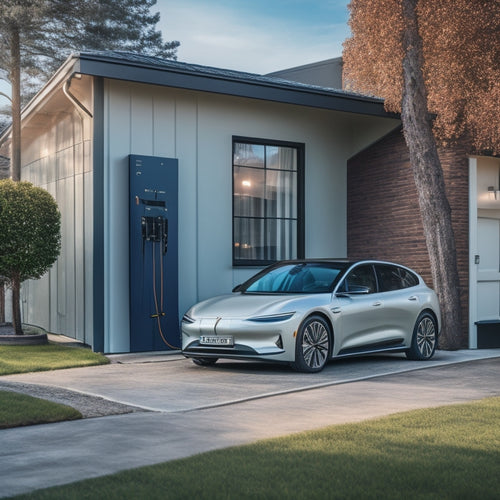
How Much Does Solar Panels Cost for Homeowners
Share
You can expect to pay between $15,000 and $30,000 or more for a solar panel system, depending on the size of your system, installation complexity, and local labor costs, with the average cost per watt ranging from $2.50 to $3.20 across the United States. Multiple factors influence the final cost, including equipment quality, roof layout, and permits. To get a better understanding of your potential investment, it's crucial to evaluate the total cost of ownership, including maintenance and operating expenses, as well as available incentives like tax credits. As you investigate your solar options, you'll uncover more subtleties that can impact your bottom line.
Key Takeaways
- The upfront investment for solar panels ranges from $15,000 to $30,000 or more, depending on the system size and quality.
- Financing options, such as loans and power purchase agreements, can help make solar energy more accessible to homeowners.
- The total cost of ownership includes the initial investment, maintenance, and operating expenses, but long-term energy bill savings can be significant.
- Government incentives, like the 26% federal tax credit, and local rebates can reduce the overall cost of solar panel systems for homeowners.
- Factors such as installation complexity, equipment quality, and local labor costs can affect the final pricing of solar panel systems for homeowners.
Average Cost of Solar Panels
The upfront investment in solar panels can be substantial, with the average cost of solar panels ranging from $15,000 to $30,000 or more, depending on your energy needs and the complexity of the installation.
However, you can offset this cost through solar panel financing options, such as loans or power purchase agreements, which allow you to pay for your system over time.
When considering solar panel installation, it's important to factor in the total cost of ownership, including the initial investment, maintenance, and operating expenses.
While the upfront cost may seem overwhelming, solar panels can provide significant long-term savings on your energy bills.
Additionally, many governments offer incentives, such as tax credits, to encourage homeowners to adopt renewable energy sources.
To get a better understanding of the costs involved, it's vital to consult with a solar panel professional who can assess your energy needs and provide a detailed cost estimate.
They can help you determine the most suitable solar panel installation configuration for your home, considering factors such as roof size, local building codes, and energy efficiency.
Factors Affecting Solar Panel Cost
You're probably wondering what drives the significant cost variation in solar panel systems. The answer lies in several key factors that affect the overall cost of your solar panel installation.
One major factor is installation complexity. The layout of your roof, the type of roofing material, and the presence of obstacles like skylights or vents can all impact the installation process. More complex installations require more labor, equipment, and materials, increasing the cost.
Equipment quality is another significant factor. High-efficiency panels with premium materials and advanced features cost more than standard or budget-friendly options. Additionally, the quality of inverters, mounting systems, and other components can also affect the overall cost.
Other factors, such as local labor costs, permits, and inspections, can also influence the final price of your solar panel system.
Moreover, incentives like tax credits and rebates can reduce the upfront cost, but their availability and value vary by location and over time. Understanding these factors will help you make informed decisions when evaluating solar panel options for your home.
Cost Breakdown of Solar Systems
As you investigate the world of solar panel systems, understanding the cost breakdown is essential to making informed decisions. You'll want to know exactly where your money is going and what you can expect to pay in the long run.
Here is a breakdown of the typical costs associated with solar panel systems:
| Cost Category | Average Cost |
| Installation Expenses | $15,000 - $20,000 |
| Maintenance Costs | $1,000 - $2,000 (over 10 years) |
| Monitoring and Repair | $500 - $1,000 (over 10 years) |
Installation expenses make up the bulk of the upfront cost, covering the panels, inverters, mounting hardware, and labor. Maintenance costs, on the other hand, are relatively low, as solar panels require minimal upkeep. Monitoring and repair costs are also minimal, but essential for ensuring your system runs at peak efficiency. By understanding these costs, you can better budget for your solar panel system and make informed decisions about your energy future.
Solar Panel Pricing by State
Solar panel costs vary greatly by state, and understanding these regional differences is vital for homeowners looking to invest in a solar panel system. You'll find that state-specific pricing can fluctuate markedly depending on factors like local market conditions, labor costs, and regional incentives.
For instance, California, a leader in solar adoption, has some of the highest installation costs in the country, with an average system price of around $3.20 per watt. On the other hand, states like North Carolina and Texas have lower installation costs, with average system prices ranging from $2.50 to $2.80 per watt.
Regional cost variations are also influenced by the cost of permits, inspections, and interconnection fees, which can differ considerably between states. Additionally, local building codes, zoning laws, and environmental regulations can impact the overall cost of a solar panel system.
As you research solar options for your home, it's imperative to take into account these state-specific factors to get an accurate estimate of the total cost. By understanding regional cost differences, you can make a more informed decision about investing in a solar panel system that meets your energy needs and budget.
Incentives and Rebate Options
Beyond understanding regional cost variations, it's equally vital to investigate the incentives and rebate options available to homeowners.
You'll be pleased to know that there are several federal and local programs designed to make solar energy more accessible and affordable.
At the federal level, you can claim a tax credit of 26% of the total solar panel system cost. This credit can greatly reduce your upfront expenses, making solar energy a more viable option.
Additionally, some states and utilities offer local rebates, which can further reduce your costs. These rebates vary widely depending on your location, so it's crucial to research the options available in your area.
You may also be eligible for state tax credits, property tax exemptions, or sales tax exemptions.
Some utilities even offer performance-based incentives, where you're paid for the excess energy your solar panel system produces.
Frequently Asked Questions
Can I Install Solar Panels on My Own to Save Money?
Venturing into the DIY solar panel installation wilderness, you'll likely encounter a steep learning curve, but if you're willing to get your hands dirty, you can utilize significant cost savings, potentially slashing your overall expenditure by up to 50%.
Do Solar Panels Increase the Value of My Property?
You'll be pleased to know that solar panels can enhance your property's value, as they're seen as a desirable upgrade, qualifying you for solar incentives, which a property appraisal will factor into your home's worth, increasing its selling price.
How Long Does It Take to Install a Solar Panel System?
You'll be utilizing the sun's energy in no time - the installation timeline is typically a lightning-fast 3-5 days! The installation process involves a careful 10-step procedure, ensuring a seamless shift to renewable energy.
Will Solar Panels Work During a Power Outage?
You'll be glad to know that solar panels can work during a power outage, but only if you've invested in battery storage options, ensuring solar energy resilience and a steady supply of power when you need it most.
Can I Finance My Solar Panel Purchase Through a Loan?
Imagine fueling your car with sunshine; now, finance your solar panel purchase like you would a car loan! You can investigate solar panel loans with fixed rates, flexible repayment terms, and financing options through banks, credit unions, or specialized lenders, making clean energy more accessible.
Related Posts
-

Essential Accessories for Heavy Riders of E-Bikes
As a heavy rider of an e-bike, you need specialized gear that caters to your unique needs. Start with safety essentia...
-

5 Essential Tips for Buying EV Charging Systems Online
When purchasing an EV charging system online, you'll want to make sure you're making an informed decision. First, det...
-

Step-by-Step Guide to Converting Your Vehicle to EV
You'll begin by evaluating your vehicle's conversion potential, analyzing its weight, aerodynamics, and powertrain co...


